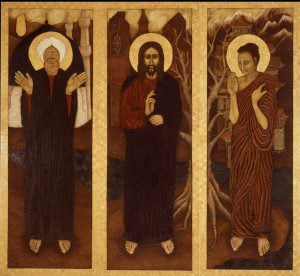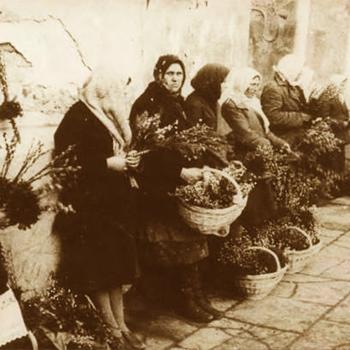Dave O’Neal, who is an editor for the largely Buddhist publisher Shambhala, is also an Orthodox Christian with a theological degree from St Vladimir’s Orthodox Seminary. As you might think, he’s very interesting. Recently Dave reviewed a book by John Garvey, Seeds of the Word: Orthodox Thinking About Other Religions. Dave found the Reverend Garvey’s book compelling and recommended it to anyone wrestling with the realities of living in a world crowded with religions and philosophies most in contention with all others about the nature of reality and the place of human beings within the great mess.
Near the end Dave wrote “In his very beautiful closing paragraphs, Father John presents as a theologoumenon the idea that anyone of whatever religion who manifests compassion, wisdom, charity, devotion, and so forth will be saved, because, as he says, “in all these movements of the soul and heart there are seeds of the Word.”
Theologoumenon is a term of art among Christian theologians, particularly the Orthodox for the learned opinions of an individual that are not meant to be understood as authoritative doctrine. So, the good reverend is being a bit slippery with his list. But, I’m also sympathetic to an upfront acknowledgment that one can be wrong. Only don’t know is a hallmark of my practice, or, at least, is when I’m on my game.
That said, I loved those markers of the good father’s that Dave cited: “compassion,” “wisdom,” “charity,” “devotion” and even that catchall, “and so forth.”
One of the most important things I’ve found in interfaith conversation is how wildly different we are. How our desire to make nice and see our way in each other, as admirable as it is in one sense, in at least one other, is completely missing the mark. We are wildly different. Wildly different. And it can be so important and useful to see the differences as clearly as possible.
And, aren’t there some things that mark out a universal?
I think, with all sorts of hedges, including that very useful term theologoumenon, that there are. And compassion, wisdom, charity and devotion are among them. Also, and so forth.
Compassion. The great mystery of relationship and our seeing our intimate connections with each other. Buddhists really like the word compassion. With its connotations of sympathy and suffering with it points directly to a central aspect of our actual lives. We are all in this together. In recent years I’ve been exploring love as another angle on this experience of our human hearts. Love is the more common term among Christians and Jews. And, it has a slightly different sense about it, with more options for passionate mistakes. Whatever, compassion and love are words pointing to something that rises as naturally as our breath. And without this near the center religions turn to dust.
Wisdom. A wonderful word. The deep etymology suggests an origin as a term of justice, a legal precedent. It also implies prudence, or self-control. The word mature also enters in here. This is a perspective on the world informed by experience. The title for my last book speaks to this, when it says “if you’re lucky, your heart will break.” Wisdom comes with hard knocks and is what occurs when we’re not destroyed or subsumed by the hurts of our lives. It lives somewhere in a sweet spot between bitterness and optimism. It carries all the weight of the center, of the middle ways taught in so many religions.
Charity. The work of the heart. Here we are called out of our selves and to service. The word has gotten a bad rap in some circles because it is closely identified with certain kinds of work, feeding the hungry, housing the homeless, clothing the naked, visiting the prisoner. These things are sometimes dismissed as putting bandages on terrible wounds that call for much more than bandages. I won’t even go into how religions are all complicit in maintaining the status quo of things, the list would be too long. Still. And, I would say charity deeply experienced calls us to challenge the status quo, the reasons people are hungry, and homeless and inadequately sheltered, and find themselves prisoners. The wisdom of charity, however, is knowing that so long as human lives are marked by poisons that are named a bit differently through the religions, there will be inequities, often terrible, and our work, the work of the heart is both to serve right now and to attend, as best, and as humbly as we can, to changes to more just conditions for everyone.
Devotion. To live in the world is to experience many things. One of those things is gratitude. To be able to see and hear and experience the world is something glorious. And it calls things out of our being, acts of devotion. Whether it be a feast where we gather to eat together and to invoke the name of the sacred in the food, whether it be reciting ancient words that have been recited by our ancestors since time immemorial, whether it be a spontaneous dance before the altar of the Lord, all these things and ten thousand more, rise, natural, like the morning star. All we have to do is open our hearts and we will know the urge.
And so forth. Among the silly and the dangerous there are many good things. Each of us will find them. And if we are curious about each other our finding will be that much broader, that much richer.
As simple as that.
Well, and back to the hedges: each religion is completely different than all the others. And they don’t touch at any point.
All of it.
And…
Nothing authoritative, just what I see. And I am ready to be corrected…
After all…
Only don’t know













